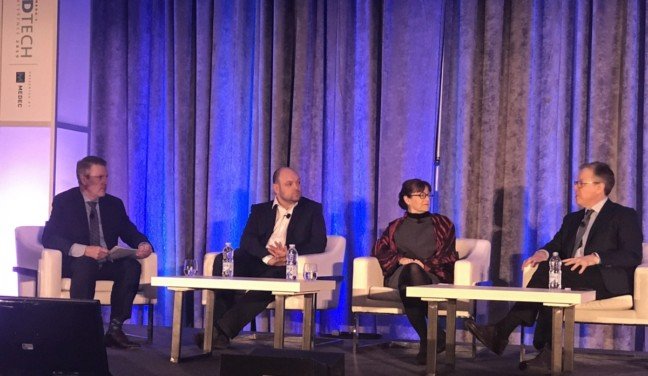Those with lived experience emphasized that a move toward patient-directed self-care is about seeing the health of people and not the healthcare of patients.
The 2019 MEDEC MedTech conference at the International Centre coincided again with the Toronto Health Innovation Week. Here we examine some of the core messages from the exceptional quality of speakers and panels discussions. Patient’s including Lori Pedersen brought an emotional atmosphere to the health executives.
“Bold transformative thinking”
“We have an obsession with bed numbers,” emphatically stated Shirlee Sharkey.
Several European countries are already reducing the number of acute care beds and long term care beds as the number of institutional beds no longer correlate to higher patient outcomes. Dr. Andy Smith from Sunnybrook described how hospitals CEOs used to boast about the number of beds in their facilities, then the number of annual patient visits. Soon they will be emphasizing health outcomes with the least number of patient visits.
The call for bold transformative thinking from Stan Cho, Parliamentary Assistant to the President of the Treasury Board echoed similar calls at last month’s #Convergence19 conference run by the Waterloo Wellington Local Health Integration Network. Read our Putting Humanity in Healthcare – system level thinking post here.
“We must bring the language of business to the business of government. New and more efficient centralized methods of
prcurement will revolutionize the way we purchase medical technology and tools in Ontario,” commented MPP Cho.
This CanMedTech2019 built on the success of the last one, which we reviewed in our previous Patients Included | Toronto Health Innovation post here
AI – Augmented Reality
“Every medtech company wants to be an AI company,” Alex Wong had remarked at last year’s Waterloo MedTech conference.
AI continues to be the hottest topic. The tremendous opportunity for AI to improve health care was articulated by Alexandre Le Bouthillier. The healthcare AI market global partners are powering sponsoring research into AI. These companies have projected revenues of $1.35 trillion by 2023. Yet, do we want the technology to make the decision or are we talking about an augmented reality where technology provides healthcare professionals with better data on which to make decisions?
Building blocks key to success
According to Robert Kaul from CloudDX, it is feedback loops that drive change.
Data presented by Bob Lavoie, Partner and Managing Director from Boston Consulting Group Global Healthcare Practice illustrated a 63 times variance on the World Health Organisation (WHO) complication rates in orthopedic surgery depending on the country in which you receive care. The data presented examined the variation in complications of deep vein thrombosis and postoperative pulmonary embolism after hip replacement surgery across OECD countries.
Driving and being compensated for patient outcomes is a disruptive evolution in the medtech business model requiring new capabilities. The BCG presentation addressed how the medtech industry has evolved from a focus on clinically relevant products to a focus on articulating value. The next disruption is toward a current focus on driving patient outcomes. The ultimate destination is a focus on population health management. BCG describe eight determinants of success for adding capabilities beyond the product.
- The proximity of service offering to a product portfolio.
- Product or procedure provides a link to the patient beyond episodes of care.
- Deep clinical expertise in disease state where the procedure is core to patient therapy.
- Leading market position and scale within and/or across the portfolio.
- A care pathway is fragmented across sites of care.
- The device represents > 20% of the overall cost of the procedure.
- Factors “beyond the product” can be impacted to improve outcome.
- Access to profit pools in a category with limited clinical differentiation.
Dr. Harinda Wijeysundera of CADTH guided the audience through a fascinating analysis of Health Technology Assessment (HTA) through wait-times and access. He concluded that in a rapidly
Canada – A great place to start a business
Building upon the sentiments of Armen Bakirtzian and author Anthony Lacavera, Canada is a great place to start a business yet a challenging one in which to scale. “Canada does poorly in scaling academic ideas to reality.” Speakers, including Sue
We have something special in our ecosystem in Canada,” points Healther Chalmers, President & CEO of GE Healthcare Canada.
It is poignant to see GE and Roche working together at a global level. Both health mammoths are offering open platforms to help hundreds of developers build apps. Speaker Dr. Matthew Prime from Roche talked about the opportunities for healthcare in a digital world. This reminds us of the way in which companies such as HP and 3M starting to open research to experts around the world. Similarly, businesses such as Ernst & Young started to understand that they could position themselves as tax matters experts by releases the tight reins on non-confidential information.
Dr. Bruce Mazer made a strong pitch for the work at McGill University Health Centre helping start-ups fast track through to technology research and adoption path as part of the Beachhead program collaboration with MEDTEQ.
It was a monumental shift in the philosophy of MEDEC as it invited Spencer Waugh, ACEAge Inc and Zach Fisch Rothbart, Co-founder and CEO of Co Health to the stage in a Candian Innovation Spotlight. AceAge Karie helps ensure patients take the right medication at the right time, keeping them safe and out of the ER. Fisch Rothbart led a breakout on How Start-up Innovation can Improve Patient Care & Experience. In his opening video address, outgoing chair, Neil Fraser announced the MEDEC strategic plan to explore collaborations.
Expect to see the launch of a new MEDEC brand, including a change in name, before the next conference in fall in 2020 as part of a combined AdvaMed conference.
Read our Health Outcome Models white paper below
DOWNLOAD THE HEALTH OUTCOME MODELS WHITE PAPER
The 2019 Waterloo MedTech conference takes place on October 2nd. Read the 2018 proceedings report here.

